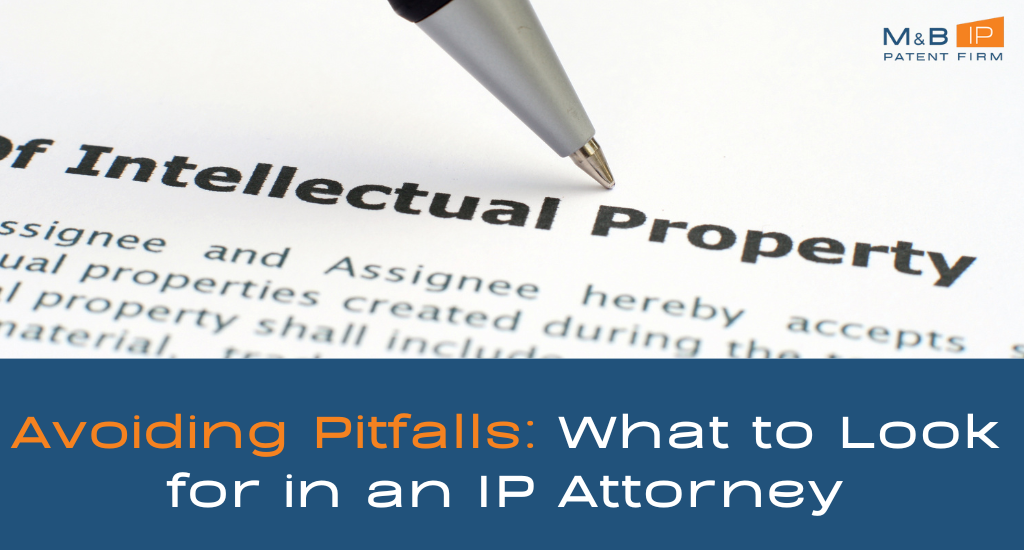- November 27, 2023
- Posted by: mbipuser
- Categories: Ip Topics, Latest article

Outline of the Article:
1. Introduction
Brief overview of the importance of choosing the right IP Attorney.
2. Understanding Your Needs
Identifying your specific intellectual property (IP) requirements. Different types of IP and their legal nuances.
3. Qualities of a Competent IP Attorney
Expertise in IP law and relevant experience. Track record of successful cases. Communication and responsiveness.
4. Local vs. Global Considerations
Discussing the importance of a attorney’s understanding of local and international IP laws.
5. Cost Transparency
The significance of clear and transparent pricing structures. Avoiding hidden costs and unexpected fees.
6. Client Testimonials and Reviews
The role of client feedback in evaluating a attorney’s reputation. Utilizing online platforms for reviews.
7. Technology Integration
How technology is changing the landscape of IP law. Attorneys embracing tech for efficient service.
8. Innovation and Creativity
Recognizing the importance of creativity in IP law. How innovative lawyers can provide strategic advantages.
9. Avoiding Common Pitfalls
Highlighting common mistakes people make when choosing an IP attorney. Learning from real-world examples.
10. Educational Resources
The value of an attorney who invests in educating clients. Access to workshops, webinars, and informative materials.
11. Client-Attorney Relationship
Fostering a positive and collaborative working relationship. Open communication and trust.
12. Handling Disputes and Litigation
Strategies for resolving disputes without going to court. The importance of a lawyer’s litigation experience.
13. Updates on IP Law Changes
How an attorney stays informed about evolving IP laws. The impact of legal changes on your intellectual property.
14. Ethical Considerations
Discussing the ethical standards expected from an IP attorney. Avoiding conflicts of interest.
15. Conclusion
Summarizing key points. Reinforcing the importance of due diligence in selecting an IP attorney.
Introduction
Choosing the right intellectual property (IP) attorney is a crucial step in safeguarding your innovative ideas and creations. In a world filled with legal complexities, finding a competent professional can be challenging but is vital to avoid pitfalls that could jeopardize your intellectual assets. Let’s navigate through the essential considerations to ensure you make an informed decision.
In today’s fast-paced business environment, protecting your intellectual property is more critical than ever. Whether you are an entrepreneur, artist, or inventor, having a skilled IP attorney can make all the difference. Let us delve into the factors you should consider when selecting the right legal professional to safeguard your intellectual creations.
Understanding Your Needs
The first step in finding the right IP attorney understands your unique needs. Different types of intellectual property, such as patents, trademarks, and copyrights, require specialized knowledge. Take the time to identify your specific requirements before seeking legal representation.
Qualities of a Competent IP Attorney
Not all attorney are created equal, and this holds true for those specializing in IP law. Look for an attorney with a proven record of accomplishment in handling cases similar to yours. Expertise, relevant experience, and a history of successful outcomes are key indicators of competence.
Local vs. Global Considerations
The nuances of intellectual property laws vary from one jurisdiction to another. An attorney well versed in local regulations might not be equipped to handle international matters and vice versa. Consider the scope of your IP protection needs and choose an attorney with the right geographical expertise.
Cost Transparency
Legal fees can be a significant concern, but a competent IP attorney will be transparent about costs from the outset. Avoid surprises by discussing pricing structures, potential additional fees, and any other financial considerations upfront.
Client Testimonials and Reviews
In the digital age, gathering information about a attorney’s reputation is easier than ever. Utilize online platforms to read client testimonials and reviews. An attorney with a positive feedback from previous clients is likely to provide reliable and satisfactory service.
Technology Integration
The legal landscape is evolving, and technology plays a significant role in streamlining processes. Look for an attorney who embraces technology for more efficient service delivery. This can include the use of legal research tools, case management systems, and communication platforms.
Innovation and Creativity
Intellectual property is all about innovation and creativity. Seek an attorney who understands the value of your creations and can provide strategic advice to maximize their protection. An innovative attorney can be a valuable asset in navigating the complexities of IP law.
Avoiding Common Pitfalls
Learn from the mistakes of others. Understand common pitfalls people encounter when choosing an IP attorney and ensure you do not fall into the same traps. Real-world examples can provide valuable insights into what to watch out for during your selection process.
Educational Resources
A good IP attorney invests in educating clients about the intricacies of intellectual property law. Consider attorney, who offer workshops, webinars, and informative materials to help you better understand the legal landscape surrounding your creations.
Client-Attorney Relationship
The relationship between a client and an attorney is crucial. Look for an attorney who fosters a positive and collaborative working environment. Open communication and trust are foundational elements of a successful client-attorney relationship.
Handling Disputes and Litigation
While prevention is key, disputes may still arise. An attorney with strategies for resolving conflicts outside of the courtroom can save you time and money. Additionally, an attorney experienced in litigation should be part of your consideration.
Updates on IP Law Changes
Intellectual property laws are subject to change. Ensure that your chosen attorney stays informed about evolving regulations and adapts their strategies accordingly. Awareness of legal changes is crucial for the continued protection of your intellectual assets.
Ethical Considerations
Ethical standards are paramount in the legal profession. Ensure that your IP attorney adheres to high ethical standards, avoiding conflicts of interest and always prioritizing your best interests.
Conclusion
In conclusion, choosing the right IP attorney requires careful consideration of various factors. From understanding your specific needs to evaluating an attorney’s experience, transparency, and innovation, each element plays a crucial role in safeguarding your intellectual property. By navigating these considerations thoughtfully, you can avoid common pitfalls and forge a strong legal foundation for your creations.
FAQs
1. How do I identify my specific intellectual property needs?
• Take stock of your creations and determine whether they fall under patents, trademarks, or copyrights. Consult with an attorney for a more detailed assessment.
2. What role does technology play in intellectual property law?
• Technology enhances efficiency in legal processes, from research to communication. A tech-savvy attorney can leverage these tools for your benefit.
3. How can I assess an attorney’s record of accomplishment?
• Look for case studies, client testimonials, and reviews online. A successful record of accomplishment is often a good indicator of an attorney’s competence.
4. Is it necessary to have a local IP attorney for global protection?
• It depends on the scope of your intellectual property. For global protection, consider an attorney.
